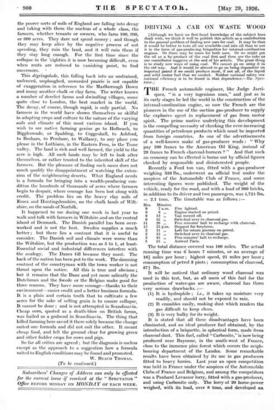CAN FARMING PAY ?
II.—POVERTY BOTTOM "pOVERTY BOTTOM ': in the Southdowns was unearthed by Professor Somerville when he was seeking to demonstrate the possibility of extracting wealth from poor soils. He made a notable experiment there, and Poverty Bottom became for a year or two a moderately rich valley. Mr. C. S. Orwin, the agricultural seer of Oxford University, discovered a poverty-stricken hill, that suggests the extinction of the Garden of Eden. Some thorns, some briars and a multiplicity of thistles and rats have created a desert. A whole landscape where corn was grown on well-tilled fields less than a generation ago is now a barren prairie. The spectacle is more pitiful than anything Cobbett ever saw. If he had ridden there he would have died of plethora of indignant thought.
This Wiltshire village is a notorious place, and yet typical. One village has quite vanished. The penultimate inhabitants were two women, the last a shepherd. Their cottage and his but are now ground to powder on tin, neighbouring roads. Church, zehool, farmhouses have gone the same way. It is not from these or from a few instances, but from a survey of all the counties where the subsoil is chalk or clay that this inference is drawn the poorer sorts of soils of England are falling into decay and taking with them the nucleus of a whole class, the farmers, whether tenants or owners, who farm 100, 200, or 300 acres. They dare not spend money ; and though they may keep alive by the negative process of not spending, they ruin the land, and it will ruin them if they stay long enough. For the first time since the collapse in the 'eighties it is now becoming difficult, even when rents are reduced to vanishing point, to find successors.
This degringolade, this falling back into an undrained, unfenced, unploughed, unweeded prairie is not capable of exaggeration in reference to the Marlborough Down and many another chalk or clay farm. The writer knows a number of derelict farms and dwindling villages, some quite close to London, the best market in the world: The decay, of course, though rapid, is only partial. No farmers in the world have shown themselves so skilful in adapting crops and culture to the nature of the varying. soils and climate of this most various island. If you wish to see native farming genius go to Holbeach, to Biggleswade, or Spalding, to Coggeshall, to Ashford, to Bosham, to Pershore, to Wallasey, to any place you please in the Lothians, in the Eastern Fens, in the Teme valley. The land is rich and well farmed, the yield to the acre is high. All such lands may be left to look after themselves, or rather trusted to the inherited skill of the farmers. But the pleasure of finding such oases does not much qualify the disappointment of watching the exten- sion of the neighbouring deserts. What England needs is a formula for bringing into a wealth-producing con- dition the hundreds of thousands of acres where farmers begin to despair, where courage has been lost along with credit. The problem lies on the heavy clay soils of Essex and Huntingdonshire, on the chalk lands of Wilt- shire, on the sands of Norfolk.
It happened to me during one week in last year to walk and talk with farmers in Wiltshire and on the central island of Denmark. The Danish parallel has been over- worked and is not the best. Sweden supplies a much better ; but there lies a contrast that it is useful to consider. The Danish soil and climate were worse than the Wiltshire, but the production was as 5 to 1, at least- Essential social and industrial differences interfere with the analogy. The Danes till because they must. The back of the nation has been put to the work. The damning contrast of the countryman with the town worker is not thrust upon the notice. All this is true and obvious ;. but it remains that the Dane and yet more saliently the Dutchman and the Swede or the Belgian make good for three reasons. They have more courage—thanks to their environment—easier credit and a better business formula. It is a plain and certain truth that to cultivate a few acres for the sake of selling grain is to ensure collapse. It cannot be done ; and is not attempted in Scandinavia. Cheap corn, quoted as a death-blow on British farms, was hailed as a godsend in Scandinavia. The thing that killed farming here saved it there solely because the change suited one formula and did not suit the other. It meant cheap food, and left the ground clear for growing green and other fodder crops for cows and pigs.
So far all critics are agreed ; but the diagnosis is useless except as the approach to a suggestion how a formula ;rifted to English conditions may be found and promoted.











































 Previous page
Previous page